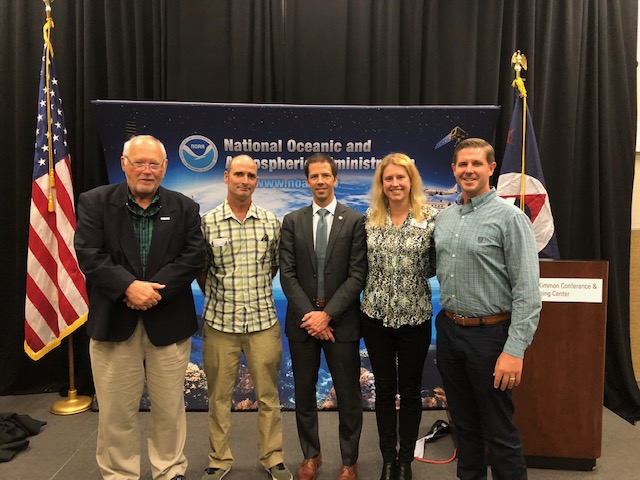Federation Coastal Advocates, Kerri Allen and Michael Flynn, attended the NOAA listening session held at the McKimmon Center in Raleigh on Nov. 1 hosted by NC Sea Grant and North Carolina State University. NOAA leadership have been touring the nation to embark on a series of public meetings to provide information about the implementation of the Department of Commerce’s 2018-2022 Strategic Plan.
Dr. Neil Jacobs, assistant secretary of Commerce for Environmental Observation and Prediction and NOAA’s Deputy Administrator, was the featured speaker and the event was primarily attended by students and faculty of NCSU, as well as staff and representatives of NC Sea Grant and The National Weather Service. Dr. Jacobs reminded the audience that the mission of the National Weather Service is to provide weather, water, and climate data, forecasts and warnings for the protection of life and property and enhancement of the national economy. Reducing the impact extreme weather events have on our nation’s economy is one of the objectives within the DOC’s 2018-2022 Strategic Plan. These strategies include:
- Evolve the National Weather Service to deliver better forecasts, earlier warnings and clearer communication of high-impact weather and water events.
- Strengthen partnerships with America’s weather industry and other members of the weather, water and climate enterprise.
- Deploy the next generation of satellites, aircraft, ocean-going ships and observation and data gathering systems.
- Develop and deploy next-generation environmental observation and modeling systems to make informed planning, resources management and investment decisions.
Dr. Jacobs also discussed his strategic plan for implementing the Weather Research and Forecasting Innovation Act of 2017, which focused on increasing high-performance computing capabilities through cloud network technology and making meteorological modeling code more accessible to the academic community. Some of the other highlights included:
- Improving space-time coverage by extracting information from private sources, such as observations collected from the shipping and airline industries.
- Improving in situ observations through drone capabilities being developed at the NWS laboratory in Boulder, CO.
- Promoting collaboration between NWS and NOS to develop coupled sea-surface models.
- Working with social scientists to improve messaging and performing a cost-benefit analysis of risk communication products.
- Discussion of engineered design standards that use the mean rather than extreme.

Pictured (left to right) Randy Sturgill (Oceana), Matt Walker (Surfrider), Dr. Neil Jacobs (NOAA), Kerri Allen and Michael Flynn (North Carolina Coastal Federation)
For more information about the NOAA listening session, visit www.noaa.gov/stories/noaa-starts-nationwide-listening-sessions.
